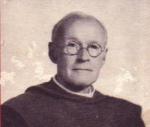Obedience, Poverty and Chastity for All?
 Brother Clark Berge SSF, The Vows Book: Anglican Teaching on the Vows of Obedience, Poverty and Chastity, CreateSpace 2014, 142 pages. (from $AUD 18.20 online)
Brother Clark Berge SSF, The Vows Book: Anglican Teaching on the Vows of Obedience, Poverty and Chastity, CreateSpace 2014, 142 pages. (from $AUD 18.20 online)
Reviewed by Ted Witham tssf
[Published in Anglican Messenger April 2014]
The late Abbot of New Norcia Dom Placid Spearritt OSB once claimed that Franciscans invented the idea of ‘vows’: Benedictines, he said, only had ‘promises’. I don’t know enough history or canon law to evaluate Abbot Placid’s statement, but as a Franciscan, I take the point that we should treat our promises with the least complication we can. Let our “yes” be “yes” and our “no” be “no”. (see Mt 5:37)
Brother Clark Berge, currently Minister General of the Society of Saint Francis, explores what it means to be a vowed person. All of us are vowed persons, as promises were made in our baptisms, and The Vows Book speaks to all Christians about the discipline and constraints inherent in following Christ. ‘The vows protect in us deep down the courage and strength to live for God,’ Br Clark writes, ‘to help God create a world we want to live in, a world of love.’
Vowed persons are counter-cultural. We have promised to make the world a different place than it is now. For those called to ‘give their lives to God in a special way’ as brothers and sisters in religious orders, the vows of obedience, poverty and chastity structure their lives to have the freedom to tell out the Good News.
Obedience means listening – listening to the Scriptures, to the Founders, to each other, to one’s inner voice and to nature. It means living as a responsible adult. Poverty is a free choice to follow Christ in a sharing lifestyle clarifying one’s social vision and helping those who are poor not through choice.
For members of religious orders like SSF chastity implies celibacy, which sets brothers and sisters free to love in new ways without the ties of family. Brother Clark is brutally honest about the difficulties of celibacy and gives practical advice on what to do with ‘sexy thoughts’.
Br Clark has printed his book in long thin columns. Each line of text has three or four words only in the style of the Catholic Workers’ Peter Maurin’s Easy Essays, making his ideas accessible to all members of the Society who have a very wide range of educational levels.
Br Clark’s ideas are also profitable for Tertiaries, as we too are vowed people, promising obedience, poverty and chastity as appropriate for our life-situation. He challenges us to use our promises as a framework to follow Jesus more closely, to find more joy in our life in Christ and to find more freedom in telling the Good News. These Franciscan values are ours too, and while our life-situations are not the same as the brothers and sisters of the First Order, our call to be Christ-like is.
It is challenging to be reminded to be responsible adults in listening to the wisdom of those around us and so learning to be more mature in our obedience. When we have so much materially our vow of poverty should cause us difficulty, and Br Clark asks us to re-consider if we are serious about sharing our resources with the whole community. Do I have the purity of heart I promised in my vow of chastity and what impact does that purity have on my ability to love as Christ would have me love?
Br Clark’s teaching about the vows may have started from his life-situation as a brother, but his wisdom, simplicity and depth is for all of us.
The Vows Book has a Foreword by Archbishop Roger Herft AM, Bishop Protector General of the Society of St Francis and the cover is graced by one of Br Clark’s own paintings, a reflection inspired by the words of Ephrem the Syrian on baptism. Br Clark’s book will help us say our ‘Yes’ with greater conviction and with joy and simplicity. It will help us bring our promises to life.

